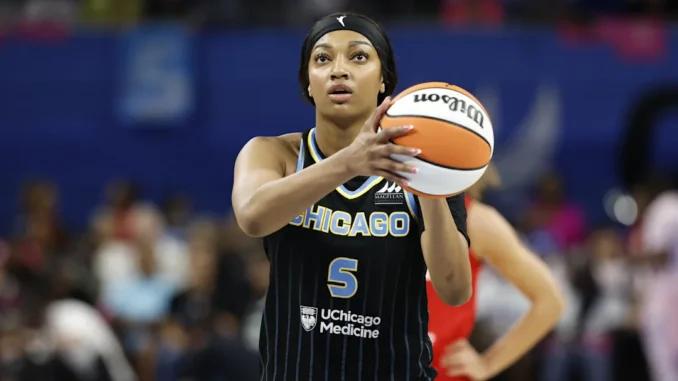
Angel Reese gets Sheryl Swoopes villain advice vs. haters

Angel Reese and Sheryl Swoopes: Embracing the Villain Role in the Face of Hatred
In the world of sports, athletes often find themselves on a pedestal, admired by fans and scrutinized by critics. For women athletes, this scrutiny can be even more intense, as they navigate not only performance pressures but also societal expectations. Angel Reese, a rising star in women’s basketball, has recently faced her share of haters, particularly following her standout performances and bold personality. In this challenging environment, she has sought advice from Sheryl Swoopes, one of the legends of the game, known for her incredible talent and resilience. This post delves into their experiences and the ultimate lessons learned about embracing the “villain” persona.
The Power of the Villain Persona
In sports, the “villain” role is often viewed negatively, but it can be a powerful narrative. Villains evoke strong emotions and can become symbols of defiance against conventional expectations. Angel Reese has experienced this firsthand. As she gained prominence, her confidence and on-court antics drew both admiration and criticism. Rather than shying away from the backlash, Reese has begun to embody the villain persona, channeling the hate into motivation. This is a strategy that Swoopes understands well.
Sheryl Swoopes: A Trailblazer
Sheryl Swoopes, often hailed as the first female basketball superstar, faced similar challenges in her career. Known for her fierce competitiveness, she became a target for criticism, especially during her time in the WNBA. Swoopes was not just a player; she was a pioneer, and with that came the inevitable backlash. However, instead of succumbing to negativity, she used it to fuel her drive and determination. Her advice to Reese emphasizes the importance of self-belief and resilience in the face of adversity.
Advice from a Legend
When Angel Reese sought advice from Sheryl Swoopes, she gained insight into how to navigate the pressures of being in the public eye. Swoopes encouraged Reese to embrace the villain role if it meant staying true to herself. “If they’re talking about you, you’re doing something right,” Swoopes told her. This perspective reframes negativity into a sign of success. It’s about flipping the script—transforming criticism into motivation and using it to propel oneself forward.
The Impact of Social Media
In today’s digital age, the impact of social media amplifies both support and criticism. Athletes like Reese are scrutinized not just by fans but by a global audience. Social media can be a double-edged sword, providing a platform for empowerment but also a stage for negativity. Reese has faced this reality, with detractors using platforms to voice their opinions. However, she has learned to focus on the supportive voices and to use the negativity as fuel. This approach aligns with Swoopes’ experiences, where she learned to drown out the noise and concentrate on her game.
Resilience as a Strategy
Both Reese and Swoopes exemplify resilience. Swoopes’ career was marked by numerous challenges, including injuries and public criticism. Yet, she always returned stronger, determined to prove her worth. Similarly, Reese has shown remarkable resilience. Each game serves as a testament to her growth, both as a player and a person. This resilience isn’t just about physical strength; it’s about mental fortitude, learning to thrive under pressure, and using every challenge as an opportunity for growth.
Building a Legacy
As Reese continues to build her legacy, the guidance from Swoopes is invaluable. The ultimate goal for any athlete is to leave a lasting impact on the game and inspire the next generation. By embracing her role, Reese not only enhances her own career but also paves the way for young female athletes to feel empowered to be themselves, regardless of societal pressures. Swoopes’ legacy serves as a reminder that strength comes in many forms, including the ability to stand firm against adversity.
The Importance of Community
Support systems play a crucial role in overcoming negativity. Swoopes has always emphasized the importance of surrounding oneself with a strong community. Reese’s journey highlights this aspect as well; she draws strength from her teammates, family, and supporters. This community helps in building confidence and resilience, reminding athletes that they are not alone in their struggles. Together, they can confront the haters and celebrate their achievements, regardless of the opinions of outsiders.
Conclusion: Embracing the Journey
In a world where female athletes are often subjected to scrutiny, Angel Reese’s journey is both a reflection of her character and a testament to the advice from Sheryl Swoopes. By embracing the villain role, she not only carves out her unique identity but also inspires others to stand tall against criticism. The ultimate lesson here is that success is not merely defined by accolades but by the courage to be oneself amidst adversity. Through resilience, community, and a fierce commitment to self-belief, both Reese and Swoopes illuminate the path for future generations of athletes. In embracing their roles, they redefine what it means to be a woman in sports—bold, unapologetic, and undeniably impactful.



Be the first to comment